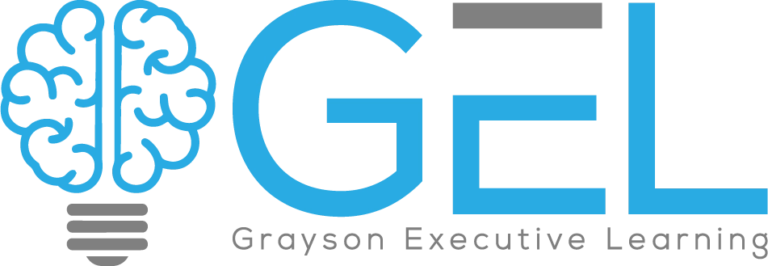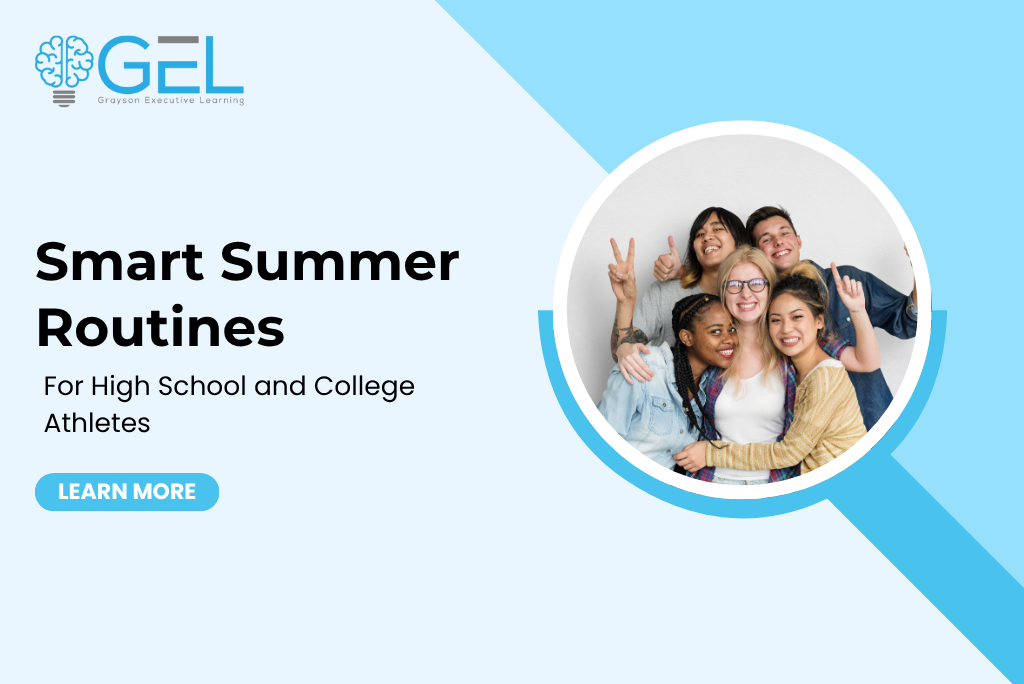Summer break can feel like a breath of fresh air for student athletes. Less class, more time, and fewer daily obligations. But for athletes looking to grow, summer isn’t about taking it easy. It’s about training smarter, recovering better, and preparing intentionally for the season ahead. The right summer routine helps student athletes maintain physical performance, sharpen academic skills, and build the executive function habits that support both.
Grayson Executive Learning coaches work with high school and college athletes who want to strike this balance. Whether you’re an athlete managing ADHD, struggling with follow-through, or simply trying to stay motivated off season, this guide offers a clear, supportive approach to summer training physically, mentally, and academically.
Why Smart Summer Structure Matters
Without the structure of daily classes or team practices, it’s easy for routines to slide. Athletes might train too much and burn out or not enough and lose conditioning. Academics may take a backseat, even if college prep or class credits are still on the horizon.
A well-planned summer schedule helps student athletes:
- Avoid injuries from overtraining
- Stay mentally sharp for the fall
- Practice independent goal setting and follow-through
- Maintain balance and avoid burnout
Start With a Personalized Training Plan
Smart training isn’t about doing more. It’s about doing what works for your sport, body, and schedule.
Too often, athletes assume that more reps, more running, or more hours automatically mean progress. But according to athletic trainers, overtraining without structure leads to injury and plateaus. Instead, focus on a tailored plan that fits your sport’s demands.
For example:
- Football players benefit from plyometrics, strength training, and agility drills
- Track and field athletes should prioritize single leg strength, mobility, and sprint intervals
- Cross country runners need endurance building with interval training and recovery
- Swimmers or gymnasts should emphasize flexibility, shoulder strength, and core stability
Talk with your coach, athletic trainer, or strength staff to design a plan that works with your goals and available time. If you’re managing ADHD or executive function challenges, consider breaking the plan into smaller daily chunks and using a habit tracker or app to stay consistent.
Get Creative With Workouts
No gym? No problem. You don’t need high-end equipment to stay in shape.
Everyday items can double as workout tools:
- Fill milk jugs with water for DIY weights
- Use backpacks stuffed with books for squats
- Try resistance bands, bodyweight circuits, or online workouts
Variety also keeps your workouts interesting. Rotate between:
- Strength training (push-ups, lunges, squats, planks)
- Mobility and flexibility (yoga, dynamic stretching)
- Speed and agility (ladder drills, shuttle sprints)
- Recovery (foam rolling, walking, swimming)
Even 45 minutes a day can make a big difference when you train with intention. Target muscle imbalances or cross syndromes like tight hip flexors and weak glutes, which often go unnoticed during the season but can lead to injury.
Prioritize Recovery and Nutrition
You don’t get stronger during workouts. You get stronger during recovery.
That means:
- Sleeping at least 8 to 10 hours per night
- Eating well balanced meals with carbs, protein, and healthy fats
- Staying hydrated with water and electrolytes
- Cooling down properly after workouts
Avoid the temptation to skip sleep or eat poorly because it’s summer. Your body and brain need fuel and rest to grow. Skipping these key components increases injury risk and mental fatigue. Meal prepping at the start of the week can help, especially if you’re balancing training with a summer job or family responsibilities.
And don’t forget about mental recovery. Stress, burnout, and emotional exhaustion can hit hard during the summer when routines fall away. Journaling, mindfulness, or simply unplugging from screens for a while can restore focus and energy.
Build Academic Momentum
Just because school’s out doesn’t mean academics have to pause.
Many college-bound athletes need to:
- Prepare for the SAT or ACT or college entrance essays
- Take online courses for credit
- Boost executive function skills like time management, task initiation, and goal setting
Use this slower season to reflect on what went well and what didn’t last semester. Can you improve your study habits? Are you consistently turning in assignments on time? Summer is the perfect time to experiment with new systems: digital planners, whiteboard calendars, or study timers like the Pomodoro Technique.
And if you’re applying to college, take the time to research programs, visit campuses, and start your applications early.
Practice Time Management With Daily Routines
Summer offers more flexibility but that doesn’t mean structure should disappear.
One of the best ways to maintain balance is by creating a daily routine that includes:
- Wake up and bedtimes
- Designated training blocks
- Mealtimes and hydration reminders
- Screen free time for reading, recovery, or reflection
- Academic or prep time
Digital planners like Google Calendar, Notion, or Trello can help organize tasks, while physical tools like a whiteboard calendar or paper planner provide visual cues and accountability.
Student athletes with executive function challenges may benefit from:
- Setting timers and alarms
- Color coding tasks by urgency
- Using sticky notes or visual reminders
These strategies reduce decision fatigue and help maintain consistency, especially when motivation dips.
Embrace Cross Training and Active Recovery
While focused training is key, cross training keeps things interesting and reduces injury risk.
Try:
- Swimming or aqua jogging to reduce joint stress
- Hiking, biking, or rowing for cardio
- Yoga or Pilates for flexibility and balance
- Dance, rock climbing, or martial arts for variety
Cross training challenges your body in new ways while giving overused muscles time to recover. It also keeps your brain engaged, which is especially helpful if you tend to get bored easily with repetitive workouts.
Stay Mentally Sharp and Motivated
Your mindset matters as much as your muscle.
Off season can be a time of self doubt for athletes who struggle with motivation without teammates or a coach watching. Use this time to build confidence, resilience, and mental toughness.
Strategies that help:
- Set weekly personal goals and reflect on progress
- Keep a journal to track effort, mood, and recovery
- Visualize your fall season performance
- Use affirmations to reinforce self belief
And remember: asking for help is a sign of strength, not weakness. Reach out to your coach, trainer, or a Grayson executive function coach if you feel overwhelmed or stuck.
Create a Summer Routine That Reflects Your Values
Summer isn’t only about athletic performance. Use this time to invest in yourself beyond the field.
Ideas:
- Volunteer or tutor younger athletes
- Learn a new skill like cooking, coding, or creative writing
- Intern or shadow someone in a career you’re curious about
- Start a blog, business, or personal project
These activities build life skills, strengthen resumes, and offer balance during intense training periods. They also help you connect with your identity beyond sports, something especially important for athletes navigating transitions.
Know When to Take a Break
Even high performers need downtime.
Rest is not a reward for productivity. It is a requirement for sustainability. Build in time to relax, explore hobbies, connect with friends, and enjoy the parts of summer that make you feel alive.
Burnout is real, and the best athletes are those who train with joy, not just pressure. Summer is your chance to reconnect with what you love about your sport and yourself.
Final Thoughts: Make Summer Work for You
Grayson Executive Learning coaches empower student-athletes of all abilities – especially those navigating ADHD and executive function problems – by helping them build routines that foster independence, confidence, and lasting growth.
A strong summer doesn’t have to mean training all day or loading up on courses. It means aligning your habits with your goals, taking care of your body and mind, and preparing to return to the school year feeling strong.
Let Us Support Your Athlete This Summer
Grayson Executive Learning (GEL) is a boutique Academic and ADHD Executive Function Coaching practice that specializes in providing premium one-on-one academic coaching services to high school and college students with ADHD and executive function difficulties.
Click here to learn how we can help your student truly reach their academic potential while developing critical life and independence skills.
We look forward to serving you.


